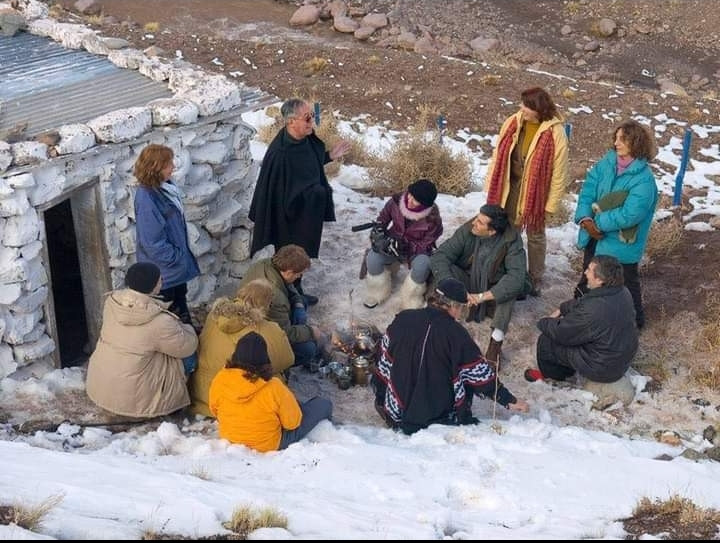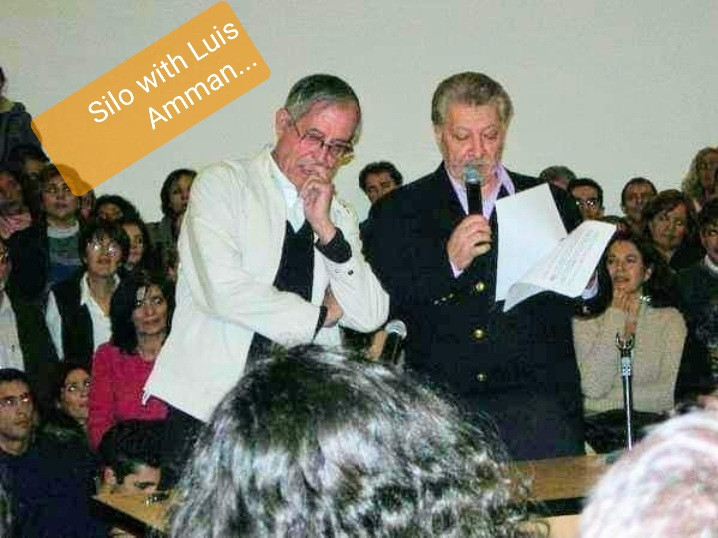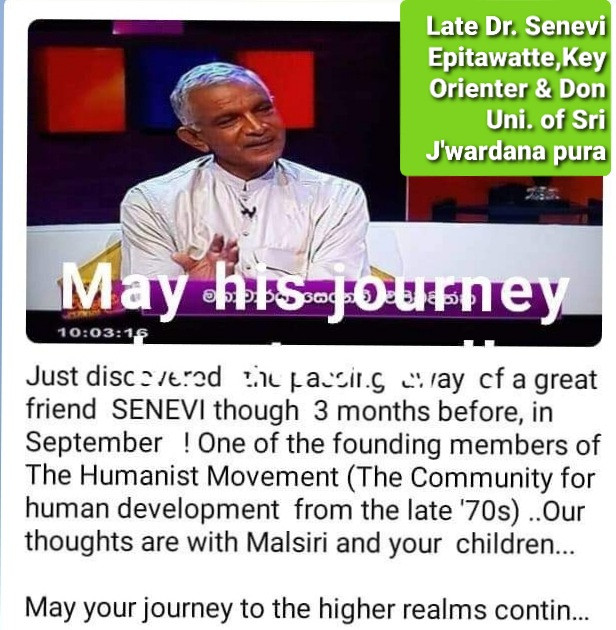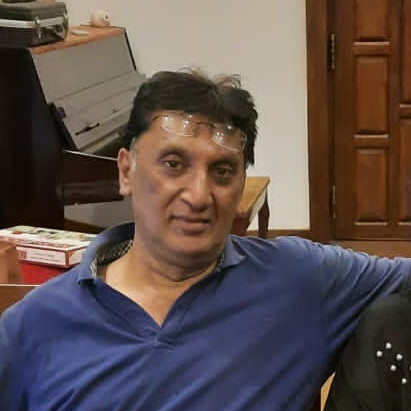-
• 2 years, 9 months ago
Transcript: Silo and the Experience Question: Silo, sometimes when I try to express your Message I find that it’s hard -- it doesn’t come out right, I don’t feel I communicate it very well. Silo: Explaining the Message is always a problem, because the Message is above all an experience -- and how do you explain an experience? How do you explain to someone what something sweet tastes like? How do you explain what a color looks like to someone who’s never seen colors? For example, what is the color red or the color blue for someone who’s never seen them? But if someone has seen the color blue, then when you talk with them they say, “Sure, I know what you’re talking about.” But how do you explain an experience the other person hasn’t had? So when you say that it’s hard to communicate your experience of the Message, I say that’s very reasonable. That’s what happens -- you don’t have a way to communicate this. So when you want to communicate this experience, you need a situation where the other person can make an effort to have this experience, to feel it. Because if you just go on explaining things this isn’t going to touch the person. It’s not going to reach them. And the experiences we transmit are experiences that have to do, not with something everyday, but rather something extraordinary that happens within oneself. These experiences, above all the experiences we’re most interested in, are experiences of change. These experiences of change – which I’ve talked about before -- are very different from everyday experiences, they’re experiences that change people. When someone is in love for the first time, their cortex lights up, it’s like they’re walking on clouds, they’re weak kneed. It’s a different experience; they have a different experience of the space in which they live; a different experience of the relations between people. The experience of being in love is one of the great experiences -- but how can you transmit this to someone who hasn’t had this experience? The experiences we have in dreams are more common; you can dream extraordinary things, things you never see in everyday life. And sometimes when you wake up, a dream can keep on affecting you; what’s happened in your dreams can be very compelling, it can be very profound. But you understand that your dreams aren’t like what happens in everyday life – they operate in a different mental space, in a different place in the mind. We said the same thing about love; that it works in another part of the mind, not the place in the mind where everyday representation operates. So, in each of us there exists the capacity to locate ourselves in other places, to reach more profound places. Our experiences are transmitted in order to produce those changes in the depths of the human mind. That’s where the Message goes, that’s where the Message hits. Experiences of Change How can you experience these things? Well, you can experience them right now. To start with, tell me, in your life you’ve dreamt—right? You must have had a dream some time in your life. People are familiar with dreams, this state of consciousness different from the one we have in everyday life. Dreams have great importance and can be very powerful, and sometimes they can change your life, isn’t that so? And at some point you’ve been in love, even if only once. This is a type of experience that can change your life. These are experiences that occur in another space, in another level, the experience of love, for example, the experiences of dreams. These are experiences that all of us have had, but which we don’t usually take into account, which we usually forget. These experiences are very revealing. They are something we go into deeply. How can you experience these things? Well, you can experience them right now. Immediate Experiences At times when we access those experiences we feel as though we’re seeing the world for the first time. I’ve never seen the world in this way—but it only lasts a moment. It lasts a very short while, and later I can’t get back to it. At times in the countryside, like here, I see a sunset. And in this sunset I feel like I comprehend everything – for just a moment. This brief moment of understanding everything, linked to the sunset, is for me an experience of change that could be very important, although normally I don’t explore its consequences. Everyone has had experiences of this type, but very few people have gone into them deeply. And that’s where we come in—with these experiences that happen in a different mental space, in a different mental situation, in another state of consciousness. Those are the experiences we deal with, and there’s a little book called The Inner Look that explains quite a bit about those experiences. That is the book we pass along to people, and we say, meditate on this little book; see if this little book resonates with you, with those important things in your life. Because pretty soon the subject will come up that you won’t be here forever. You are going to go. We’re all going to go. Life ends at some point. How will this movie continue? Are you gone forever, or does something in you continue? You’d like to have some answers to this before leaving—because surely you will leave… but you’d like to have some answers about all this. Well, this little book talks about those things, these experiences that happen in life, with the meaning of life, with what happens after life, what happens with death. All these things interest us, and they interest many other people, too. That’s why a lot of people listen to this message. But we don’t talk a lot about a theoretical message, a message of ideas, but rather about the affective, the emotional, and the experiential. This is what we work on with people who come to us. So, people come and ask us questions, and we say: let’s do an experience, and that’s it. Question: In all these years you have expressed your message in various forms… Silo: Through different things, sure. Question: …and there are people who say you’re always changing your mind about things… but we, or I, don’t get that impression. How do you explain this? Silo: But, do you have the sensation that it’s always about the same thing? Question: The same, yes, right from the beginning. Silo: It’s as though we talked about translations of the same thing, different translations, different languages, with the same meaning. These various expressions occur because people look at things from different angles, and they ask questions from different angles. And people that ask from a certain angle get an answer corresponding to that angle, different from someone else’s. And this can lead to a lot of confusion, where some interpret things one way, and others a different way. Varying Interpretations Our minds are so closed that we always believe there is only one valid interpretation. But it turns out that interpretations are diverse because people’s points of view are diverse. This is also true of language. It seems that they are different things, but actually in the end they’re the same story. They’re different translations of that message, they’re different translations. You have seen and you have the experience that we are always speaking about the same thing, always speaking of the same thing. Yes, that’s how it is. Question: If you were speaking with someone who had never heard of this message, what would you point to as the central concern? Silo: The central concern is human suffering. Suffering Our central concern, our theme, is suffering. How is it that suffering exists in the human being? How can we overcome suffering? What path leads to more suffering? How can we leave suffering behind and reach somewhere else? That is our theme, the theme of suffering. Suffering is not only pain… physical pain. We make a big distinction between pain and suffering. One can feel pain because of hunger or when one’s body hurts, and it is science and justice that can relieve human pain. But human suffering is mental, and this suffering will not be resolved through the development of science or through the development of justice. The human being has to make an effort to enter other regions of the mind. That’s our theme, that’s one of our themes. Logically, there are other themes that are closely linked to that of suffering. One is the theme of illusions—the world one imagines, the things one imagines about oneself, and the things one imagines about others. The theme of illusion is key for us, and it’s closely linked to suffering. Depending on how one handles one’s illusions, suffering will increase or it will decrease. And finally, there is the theme of beliefs, the things that one believes. What we believe about ourselves, others, the world, about life, about life’s duration. When one is in a normal state doing things it is always with the feeling and the belief that one is not going to die. Of course, if you say to someone: “Listen, are you going to die?” they’re going to answer, “Of course.” But at the bottom they don’t believe it. They say, “Yes, yes, of course, that’s right, we’re all going to die”, but they don’t believe it. If in that moment they really felt it, they’d fall down shaking. So then the theme of suffering, the theme of illusion, the theme of finitude, the theme of beliefs—these are the topics that interest us, these are the themes we’re involved in. Question: People always see these things in a religious framework; whether you believe in god or not. Silo: Of course, of course, but it turns out that we can’t include our themes within the realm of the religious. To be included in that realm we would have to have gods, priests, sacred books. And for us, the gods or god—which would be the same thing—for us that’s something unconfirmed, for us it’s simply something uncertain… God is Something Uncertain ... and if you ask me, "Well, but what about you personally—do you believe in god or not?" Personally I have no interest in the issue, because god is not the one who is going to solve the problem of my suffering, god is not the one who is going to solve my problems about the future—not at all. And those who say they have god to solve those problems, those people suffer so much, they have so many problems related to the future, so much insecurity, so many things, that you have to wonder if they themselves do believe in god. So let's put it more simply, let’s make it easier: god is something uncertain, and with that, from that starting point, you begin with yourself to do things and make changes. Many people are going to say, "Well, I believe in god” and others will say, "I don't believe in god.” And we're going to say, "God is something uncertain." "What do you mean, something uncertain?" “Of course, obviously god is something uncertain. All I have to tell you is that god is uncertain, for god to be something uncertain." "Yes, but I believe," the other guy says. "Sure, you believe, but I tell you it's not certain..." Then the other realizes that this raises the issue of the gods being something uncertain. And if God is something uncertain then there are problems all over the place. If God is something uncertain, then it’s even less certain that anyone can use the gods to impose things on others—that's much worse. Question: So then in two steps, one for believers and the other for non-believers. What do you say to the believers, to the ones who believe in god—what do you say to them? Silo: What I say is, fine, believe or don't believe. I think it's very good if you believe, very good if you don't believe—it's the same. But that isn’t the theme that will get us out of the world of suffering or create a new kind of human being; it isn’t the issue. That's what I tell people who believe. And if someone says they don't believe, fine, then they don’t believe. Because the theme is something else, the issue is something else—it's not about whether or not you believe in god. The real issue is how do you solve your existential problems. And it is obvious that believing or not believing in god doesn't solve those existential problems. We can do an experiment—it’s like a recipe, take three spoonfuls of sugar—take a person with a strong belief in god. Ask that person how they've solved the problems in their life, their anxieties, their fears. Then take someone who doesn't believe in god and ask them how they've resolved their issues, their fears, and we will find in both cases—cases that are so different because one believes in god and the other doesn't—we're going to find they're very similar. They have the same anxieties, the same fears, the same desperation about dying. So then we're going to say to ourselves, these issues are very interesting, but they don't get to the point. It's the study of suffering, going deeply into the issue of suffering that gets to the point. That is what is relevant. The point is to understand that beliefs are not what are going to solve our problems. The point is to understand that we live afraid of things; we're full of fears and anguish. That's what seems important to us to emphasize. Question: And what about someone who’s never heard about this before? What do you say to that person? How can they begin? How can I begin to overcome my suffering—where do I start, what's the first step? Silo: I don't tell them anything. They're the one who has to come and ask. That's also important. When Asked We Answer We don't even have any way to reach people. It’s not as if we have mass media. We don’t have anything to do with what they say about us in the news media, it’s always distorted. So we don't reach people, we are a voice speaking in the wilderness. It's the people who come to us, the people who ask us, "What is this you say about experience, what is this you say about suffering?" It's the people who ask us—and then we answer, and then other people continue the response. So we don’t try to proselytize as that’s normally understood. We explain our things because there are people who are interested in these things. Many people are interested in these things, and I think that more and more people are interested all the time. Well, now it's a different form. We are in a different kind of society; we're in postmodern society now where the ideas of modernity no longer work. We're very far from the Renaissance and very far from the Modern Age. Things no longer move with doctrinary explanations, with explanations of efficiencies, as if those were the great values, no. That no longer works, now other things work. For now it’s a bit difficult, but soon people will understand that values have already changed, that the world is different and that crude ideological proselytizing no longer works. It's a problem for some people. Well, there will be a few more years of problems, but it’s going to keep getting better. Comment: That’s a very interesting point of view. Not the usual thing. Silo: No, it's not very common. A little longer with these problems, these things, but what will happen with these ideologies is like what happens in daily life with certain illusions that one has that one doesn’t want to let go of. Beliefs, Ideologies, Illusions They don't want to give up these illusions because they believe that it's thanks to them that they can live. But finally those illusions fall, and you begin to feel more freedom than you would have imagined. So it is with the ideologies—many people believe that they need to have that ideology, because without it, well, what is there to live for? And it turns out that what that person has is a big illusion, as big as a house, and this is a problem because it distorts reality. So I'm saying the world is changing, and that soon people are going to start letting go of their ideologies without too much difficulty, like clothing they’ve outgrown. And that's not because the human being is falling, or in decline... Quite the contrary, it's because the human being is growing, and these clothes are now too small, these ideologies no longer fit, people have outgrown these illusions. In this historical moment it's the growth of the human being that produces that sensation of asphyxiation. But we're doing fine, things are not so bad. But all this will take a little more time. Question: There are people who say you are a man like any other, and others who say you are a prophet, others who say you are a demi-god, a god, a devil—people say many things… Silo: I believe that people have the right to say all that … and what of it? It doesn’t concern me in the least if someone says, “Well, he’s a prophet…” And? It's neither here nor there. “He’s just an ordinary man.” And? Because the theme is how can one move beyond the problems of suffering, of pain, all those things. It doesn’t deform the message at all if a person believes one thing or another about me. Silo and the Experience
Commentaries of Silo Center of Studies Punta de Vacas 2008

















